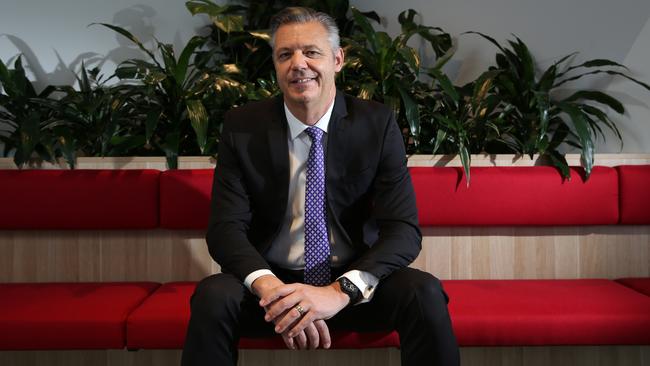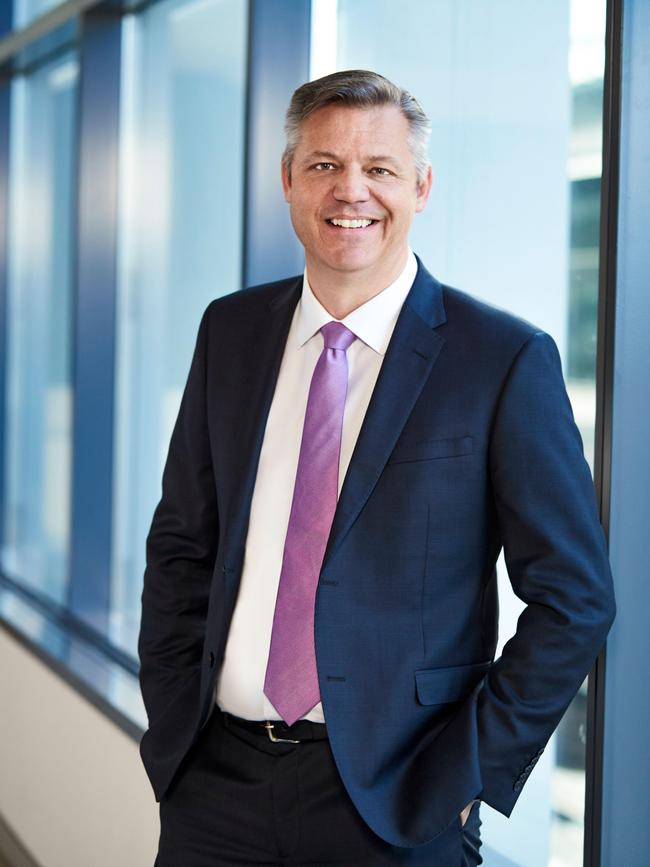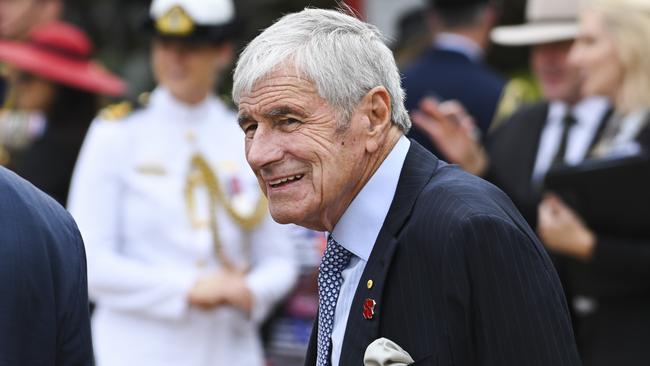Seven chief James Warburton on his father’s tragic passing and being sacked by Network Ten
Seven boss James Warburton on the tragic death of his father, the lessons from being sacked as Ten CEO and the key to turning around Seven and working with the Stokes family.

On the afternoon of February 22, 2013, James Warburton was absorbed in his favourite hobby, fishing from his dingy on Sydney Harbour, when his phone rang. Eddie McGuire was on the line.
“I got one of the biggest fish I’d ever caught in Sydney Harbour, so I was feeling pretty good,” Warburton recalls.
“Eddie said, ‘James, two things. One, I was there longer than you.’ Which we had a laugh about.”
That day Warburton had been sacked as chief executive of Ten Network by its Lachlan Murdoch-chaired board after just over a year in the role. It was nearly six years since McGuire had quit as CEO of Channel Nine after lasting only 17 months.
“And then Eddie said, ‘You might lose your confidence, but you never lose your ability.’ I just thought it was nice of him. He had nothing to gain by calling me, and actually it was some pretty good advice. You’ve got to get back on the horse, so to speak. You don’t lose your ability, and you’ve got to believe.”
It is now media industry folklore that Warburton returned to the Seven Network in 2019 as CEO of Seven West Media, replacing Tim Worner, the station he first joined as a sales director in 2003 before being lured to Ten.
He soon launched a big restructure of the business, but it failed to arrest a decline in the Seven West share price, which fell to just 6c in April 2020.
Fast forward two years to August 2022 and Seven announced its strongest financial result in a decade, thanks to the acquisition of Prime Media Group and growing its online on-demand service 7plus.
The network had invested in content, regained its revenue share and tackled its debts head-on. When Warburton took over Seven West, it was weighed down by $589m in debt, with leverage of two times. It is now back to less than 0.6 times thanks to the work of chief financial office Jeff Howard. The share price is still over the 40c mark after topping 70c a year ago.
Warburton is not about to declare victory after Seven West’s profits fell 5 per cent in the period to December 31 amid an advertising market hit by interest rate rises, but he says the network’s position reflects the successful implementation of a three-year strategy.
The key, he says, has been an unwavering focus on a goal. And this time around, he’s had the luxury of more time.
“I’ve always been a realist and yes Ten was difficult. The thing with media businesses, and particularly television businesses, is that you are only ever one hit show away from being exceptional. When it goes bad, it can go bad really quickly, too. I probably, in self reflection, would say I was incredibly ambitious at Ten, in terms of my timeframes,” he says.
“There were a lot of inherent problems in Ten’s business, which have been evident and continue to be evident in the third player. So it dents your confidence.”
But he says the Ten experience taught him plenty. He over-thought the strategy and misread the culture.
“You go from your very established business where you are probably seen as the successor, the heir apparent (at Seven), and you dive into a new company and culture you don’t know about and it's the first time you are the CEO.
“You are probably a bit naive, a bit wide-eyed, you need more time than 11 months and you get fired. It makes you, in your next roles, really clarify your strategy. What are you going to do? Can you do it?”

After long stints working in agencies such as McCann Erickson and DDB Needham, Warburton has always been a salesman at heart. Seven’s focus on rebuilding content over the past three years has played to that strength.
But he’s also a voracious consumer of media about himself. Before our interview his personal assistant sends me a collage of media clippings documenting his corporate life over the past two decades. A critic might say it simply smacks of ego. But there is more to it.
One of those stories, since the day it was published in The Sydney Morning Herald on February 10, 2020, has taken pride of place pinned above his desk in Seven’s Eveleigh head office in Sydney.
Its headline screamed: “Stokes’ $1.35m man James Warburton has an impossible task at Seven.” But the killer line soon followed in the text: “James Warburton’s tenure as chief executive of Seven West Media will be a failure.”
“I’ve always just collected headlines, because I think they are interesting – I think it’s more interesting when other people comment on it, versus you,” he says when asked about his collection.
So why pin up the SMH piece?
“That one in particular was just the challenge. It’s nice to now look at that and go ‘Okay, yeah. It wasn’t overly negative. It was just saying no matter who it was, they would fail. We didn’t fail,” he says proudly.
“You know, it’s the game we’re in. It’s pretty brutal. We’re all out there and we’re all giving each other a hard time. But its fun.”
Media man
Sitting in his Eveleigh office gazing out the window at the Sydney CBD skyline, aside from a regular and slightly off-putting twitch of his eyes, Warburton looks relaxed.
Despite his reluctance to do interviews, he’s prepared to reflect on the lessons of leadership gleaned from his stints at V8 Supercars, APN Outdoor and Seven.
After the Ten disaster, his four-year term at Supercars saw him boost revenue by 40 per cent and earnings by 140 per cent.
Then at APN, a successful restructure of its digital and sales offering saw it become a target of French advertising giant JCDecaux, which paid $1.12bn for the business in June 2018.
More recently Warburton was a shareholder and director of digital out-of-home (OOH) media company Shopper Media, which was sold to Woolworths last year for a reported $150m.
He’s happy to be tagged a turnaround specialist.
“I’ve always had an ambition to go into harder roles. Because I think it’s exciting, its challenging and it keeps you highly motivated on the way through,” he says.
He says the key to a successful turnaround is to be “very frank, very honest, very open and very transparent”.

“Here’s our plan, here’s what we are about. So everyone can judge us – the staff, the investors, the media. They can see how we have gone against that plan.”
He often asks his executive team a simple question: What are you adding over and above?
“Yes there’s an expectation around the basics of what you should be doing in a role and some expectations about behaviours and culture and everything else. But actually, what else can you do? How can I unlock in that in my team and my people? That’s something that I’ve always been really, really passionate about. I’ve been lucky that I’ve probably been able to motivate more people to be better.”
Most recently Warburton was lauded for his negotiating skills in big sports rights negotiations with the AFL and Cricket Australia.
“The focus for this business going forward is digital, so with the AFL we needed to have those rights and we were prepared to walk away from the sport if we didn’t,” he says.
“We were also very clear with Cricket Australia – some would say aggressive (Seven also launched court action against CA to terminate its rights deal) – about what we wanted to begin. A better, shorter Big Bash, etc and it was an onerous contract. If we had lost it, we would have lost it and we would have moved on.”
He also stresses it was not hard to convince Seven West chairman Kerry Stokes to walk away from his beloved Olympic Games last month, when Nine snared a five-year $305m rights deal.
“This is not about Kerry saying, ‘No, we are doing the Olympics’. This is actually about good business decisions and discipline,” he says.
In fact he says Stokes, “for better or worse at times, has given me my head in terms of being able to run the business.”
“The positive bit about having a founder shareholder is that if things were not going well, you would absolutely know about it,” he says, before adding with a wry smile: “But when things are going well – touch wood – so far so good.”
He describes Stokes and his son Ryan, the CEO of Seven West’s parent firm Seven Group, as a “good combination together”.
“It is a very strong relationship and very considered in terms of the way that they work together, and there are obviously very different focuses.”
Warburton credits the Stokes family’s long time legal advisor and Seven commercial director, Bruce McWilliam, for being “instrumental” in the sports rights deal negotiations.
His only critique of McWilliam is uttered dryly with tongue firmly planted in cheek: “Sometimes Bruce texts the wrong people. Or he fills up your inbox with 475 trillion emails.”
Curiously McWilliam was Stokes’ attack dog when he sued Warburton to stop him defecting from Seven to take up the Ten role. But the latter says too much is made of alleged personal animosities in the media world.
“Business is never personal. People get wound up about competitors. But it’s never personal. We all do the best we can for our companies,” he says.
This extends to, apparently, holding no grudge against Lachlan Murdoch.
“I’ve never said a bad word. All I said was I needed more time. 11 months to turn around a company is just not enough time, particularly when it is a content-based company where the cupboards are bare,” he says, adding there were no legal disputes over his sacking and that Murdoch and Ten honoured the 12-month payout term in his contract.
“I think I saw Lachlan two weeks later because I needed his approval to go to Supercars and obviously keep the Ten payment. I’ve never spoken ill of that. You make your decisions and you live by them.”
Leaving a legacy
It was Warburton’s idea, in conjunction with Skye Leckie and her sons, for Seven West to set up the David Leckie Scholarship last year in honour of the network’s long-serving chief executive, who passed away in July 2021.
It was Leckie, once also a legendary TV boss at rival Nine, who first poached Warburton to Seven from Universal McCann. Yet ironically it was Leckie’s determination to remain Seven CEO that led Warburton to shift to Ten.
“I just thought it was a really nice tribute to him. It’s something that he probably would have hated,” the latter says of the scholarship.
“But I think it is quite a nice way to keep his legacy alive and he meant a lot to a lot of people here. He’s a guy who actually meant a lot to me as well.”
Leckie’s well-known struggles with alcohol taught Warburton the importance of having hobbies outside work and devoting time to family.

He and wife Nikki, formerly an Austar executive and head of marketing at auto group Audi, have two teenage boys from 22 years of marriage. The family is into watching live sport and Warburton loves fishing and surfing, the latter with his older 19 year old.
“My favourite time of the week, personally, is Sunday morning. I love that time from 5am-8am on a Sunday. I find that really valuable to reset,” he says.
Given he and Nikki have always worked full time, he says they have “juggled” parenting.
“It used to be something that annoyed David (Leckie). I’m in the office early, but I’m out in good time and I would go home most nights for dinner. He hated that. He wanted everyone to go to his office and have a drink.”
Warburton’s passion for fast cars – he drives an Audi SQ7, complete with its V8 4.0 litre engine – comes from his late father Richard, who each year took his son to Bathurst in the family’s Holden Statesman on his wife Judy’s birthday.
On June 4 2013, Richard was tragically killed when a ute veered onto the footpath of Willoughby Rd on Sydney’s North Shore as he walked to the pilates class he attended three times each week. He was 76.
“It was just one of those things. You learn to live with it. You’ll never get over it,” his son now says, staring out the window.
“It was just extremely unfair. It was just wrong place, wrong time.”
He says his father adored his six grandchildren, but tragically missed seeing them grow up.
“My sons were quite young at the time so he would have really loved that. I think he would have been a really good role model. He was a very patient man.”
Richard Warburton had a common refrain in life, which is now somewhat haunting. His son will never forget it.
“Dad used to say ‘when your number is up, your number is up’. He said that a lot. Which is actually strange, for such a freak thing to happen to him. It’s almost, I suppose, pretty telling in terms of that,” he says slowly.
“So I think you’ve just got to be focused on having good health, family and living your life. Make sure you are enjoying that part.”


To join the conversation, please log in. Don't have an account? Register
Join the conversation, you are commenting as Logout